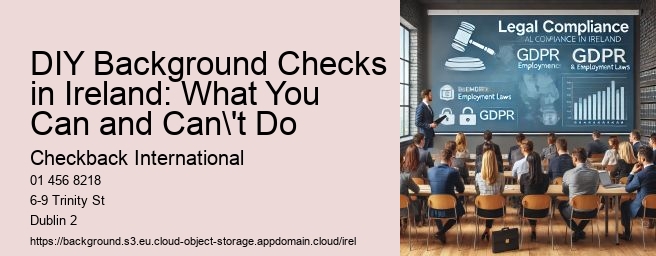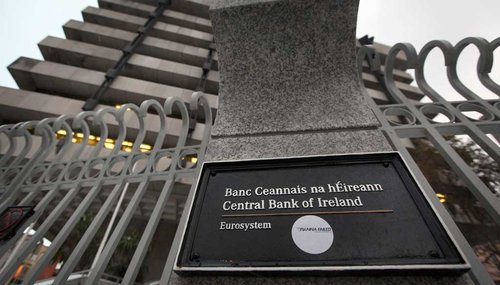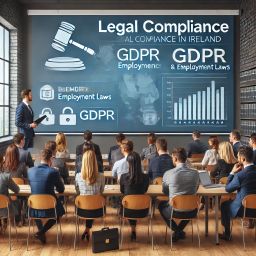

The Scope of Irish Employment Vetting
You may need to provide extra documents to dispute the findings or ask for a new review of the original information.
Overview of Checkback International's Screening Services
Character References CheckPSA vetting maintains high standards within the security sector, yet mistakes can compromise the process.
PSA vetting validation helps security service providers meet standards required by the Private Security Authority (PSA).
Timeframes and Processing Periods
Best Practices in Pre-Employment Screening
Pre Employment Vetting in Ireland
The employer then sends these details to a licensed background check provider qualified to perform PSA vetting.

Pre-employment vetting in Ireland follows defined turnaround time periods that vary based on the type and scope of checks being conducted.
2.Documentation of unemployment gaps
Pre-employment vetting in Ireland functions as a core business process combining compliance requirements with risk management. Through screening protocols, including ECRCs, credit checks, and specialized security verifications, organizations maintain high standards during recruitment. The use of processing systems and compliance with data protection laws allows Irish employers to evaluate candidates while meeting legal requirements.
The Consequences of Skipping Background Checks in Irish Hiring


How Technology Is Transforming PSA Vetting Processes
Employment history and reference checks are part of Ireland's background screening process. During these checks, employers verify a candidate's work history over the past 5 years, or since leaving secondary education, whichever is more recent.
This software cross-verifies information from multiple international databases for thorough background checks. Digital application forms and virtual document verification help process candidate details, while algorithms find inconsistencies.

These include 5-year background screenings for security service providers, electronic security installers, and access control personnel.
These checks give employers information about candidates' financial responsibility and reliability for hiring decisions.
1.Security Firms: Strong vetting builds trust in security personnel, which matters for client confidence and contractual obligations.

These rules support lawful handling of sensitive personal information during the pre-employment vetting process.
All checks follow Irish and European Data Protection legislation.
Processing duration varies based on the country and how quickly institutions respond.
A background check in Ireland involves reviewing a person's criminal, financial, or personal records to assess their suitability for a role or position.
The duration can vary but typically takes between 1-2 weeks, depending on the type and complexity of the check.
Garda vetting is a specific type of background check required in Ireland for individuals working with children or vulnerable adults, involving checks against police records.
Yes, you must obtain consent from the individual before conducting any background checks in Ireland.
Not for all employees, but certain sectors such as healthcare and education may require comprehensive checks.
It includes checking for any criminal convictions or offences recorded against the individual.
Yes, individuals can request their own background checks in Ireland for personal review or to prepare for employment screenings.
Skipping background checks can lead to hiring unsuitable candidates, which may result in legal and reputational risks.
Yes, police clearance is a general criminal record check, while Garda vetting is specific to roles involving vulnerable groups and includes more detailed investigations.
You can request transcripts or degrees directly from educational institutions or use third-party services that specialize in educational verifications.
Information about spent convictions, certain types of personal data, and other protected characteristics under GDPR is off-limits unless specifically relevant and lawful to access.
International checks may involve additional complexities such as different laws, languages, and longer processing times.
No, background checks do not affect your credit score as they do not involve a credit inquiry that would impact the score.
Best practices include securing data in compliance with GDPR, limiting access to authorized personnel, and ensuring data is stored for only as long as necessary.
It depends on the industry and role, but typically every 2-3 years or when significant changes occur in the individual’s role or responsibility.
While not specific by law, many IT positions require checks due to access to sensitive or proprietary information.
GDPR regulates the processing of personal data, ensuring that background checks are conducted in a lawful, fair, and transparent manner.
Yes, but it must be done lawfully and with the individual’s consent, considering the relevance to the role.
Penalties can include fines, legal actions, and reputational damage, depending on the severity of the non-compliance.
Remote work has increased the importance of thorough background checks, especially for those in positions of trust or handling sensitive data.
Best practices include conducting similar checks as for permanent staff, especially if they have access to sensitive or critical areas.
Ensuring fairness involves following consistent procedures, obtaining consent, and allowing candidates to dispute inaccuracies.
Yes, it’s recommended to tailor background checks based on the specific risks and requirements of each position.
Signs include transparency about services, compliance with legal standards, positive reviews, and strong data protection practices.
Handling involves assessing the relevance to the job, discussing findings with the candidate, and considering legal and ethical implications.